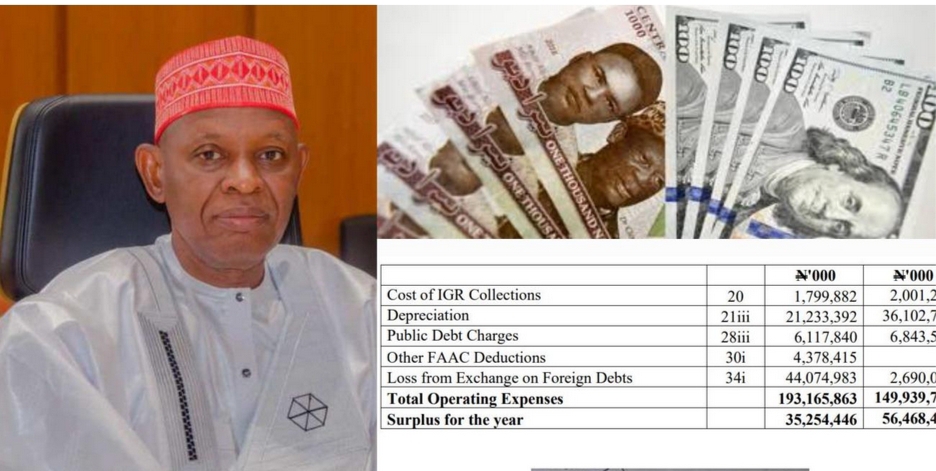
The Kano State government has reported a significant financial setback in 2023, recording a loss of ₦44.07 billion on its foreign debts, a consequence of the naira’s continued depreciation against the US dollar. This figure marks a sharp increase from the ₦2.69 billion loss recorded in 2022, according to the state’s 2023 audited report.
The substantial loss is expected to strain Kano’s finances, potentially hindering the delivery of essential public services. In addition to the foreign debt loss, the government incurred ₦6.1 billion in public debt charges in 2023, slightly lower than the ₦6.8 billion reported in 2022.
A recent review of Kano’s 2024 budget performance revealed even more concerning debt figures. Between April and June 2024, the state spent ₦60 billion on public debt servicing, a stark contrast to the ₦4.6 billion originally budgeted for debt servicing for the entire year. The breakdown shows ₦1.6 billion was spent on domestic interest or discount payments, while a staggering ₦58 billion was allocated to domestic principal repayments.
Debt Servicing Overshadows Development Spending
Kano’s debt servicing costs vastly overshadow expenditures on key public services and infrastructure. For instance, in the second quarter of 2024, only ₦628 million was spent on constructing and providing public schools, while road provision consumed ₦7.1 billion—both amounts dwarfed by the ₦60 billion spent on debt servicing.
The state’s financial burden is compounded by its limited revenue generation. Internally generated revenue (IGR) amounted to just ₦14 billion for the first half of 2024, meaning the debt servicing cost was over four times its IGR.
Capital expenditures in critical sectors also fell short in comparison. The Ministry of Works and Housing spent ₦18.6 billion during the same period, while the Ministry of Water Resources allocated ₦4.2 billion. The total capital expenditure for the economic sector reached ₦36.8 billion—significantly lower than the ₦60 billion dedicated to debt repayments.
Even personnel costs, including salaries, amounted to ₦42 billion for the first six months of 2024, falling short of the funds used to service the state’s debts.
Implications for Kano State
These developments highlight the severe financial challenges facing Kano State, as rising debt obligations leave little room for critical investments in education, infrastructure, and other public services. Analysts warn that unless the state addresses its debt management strategies, the growing burden could undermine its socio-economic development.
The situation reflects broader concerns about the impact of naira depreciation and debt servicing on subnational economies, raising urgent questions about fiscal sustainability and resource allocation priorities in Kano State.

